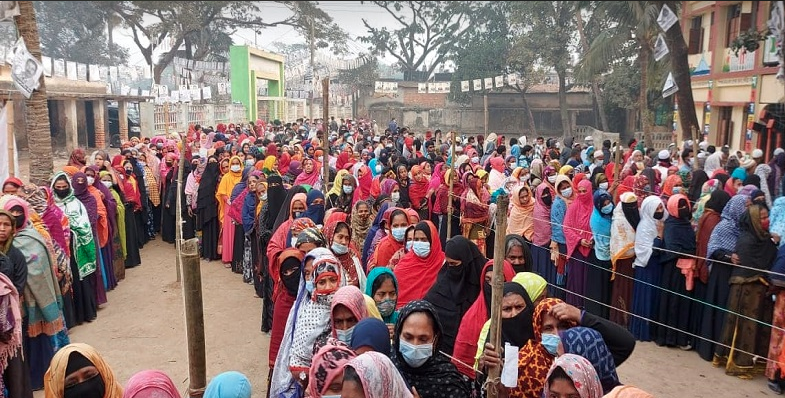Election festival turned into fear: what happened?
Sanjida Afrooz
Publish: 07 Jan 2024, 07:59 AM

In Bangladesh, voting is akin to a festival, with a widespread response nationwide. People make special preparations at home, exhibiting enthusiasm for various types of elections—be it union, upazila, municipality, city corporation, or national elections. Since the downfall of the Ershad government in the 1990s, elections in Bangladesh gained immense importance as the primary means to form or change the government. The start of a new series of elections in Bangladesh commenced on February 27, 1991, under the interim government, marking the establishment and exercise of people's suffrage. Subsequently, the national elections held on June 12, 1996, and October 1, 2001, were widely acknowledged as acceptable elections. The elections under the military-controlled caretaker government on December 29, 2008, were apparently fair and free. However, they were deemed as an election of "mechanism." The announcement by Awami League President Sheikh Hasina, validating all actions of the Fakhruddin-Mainuddin government, led to a landslide victory in the mechanism election.
Following that, the political landscape of the country underwent significant changes. Sheikh Hasina's government, during the subsequent election, took a notable step by abolishing the caretaker government system. On January 5, 2014, an election was conducted without widespread participation, as the Bangladesh Nationalist Party (BNP) boycotted it. Awami League leaders secured victories in 154 seats without having to face any opposition in this scenario. However, in the remaining constituencies, voter response was minimal, with many candidates winning with less than 5 per cent of the vote being cast.
In the December 30, 2018, elections, the Bangladesh Nationalist Party (BNP) participated. However, despite Sheikh Hasina's promise of fair and free elections, BNP candidates faced significant obstacles in entering the election field. Widespread discussions arose regarding the alleged filling of ballot boxes with sealed ballots in numerous centres on the eve of the election. This event, often called the "night vote" scandal, is widely regarded as a major fraud case.
Currently, another election is scheduled for Sunday, January 7. However, there is a prevalent sentiment among the populace that the upcoming election will follow a similar pattern. As a result, there's a lack of interest among the people in participating in this election, given its perceived predictability.
Elections in Bangladesh have transitioned into a historical matter. The absence of rivalry and competition in elections, spanning from local levels (Union Parishad) to the national assembly (Jatiya Sangsad), resulted in a lack of the typical electoral atmosphere or festivity associated with polling.
Elections in the past used to evoke a festive atmosphere nationwide, engaging people of all ages who visited polling centres with a sense of celebration. Candidates and their families engaging in door-to-door campaigns to secure votes contributed to fostering social harmony and unity around voting. However, this spirited environment has faded away.
The recent election campaigns have introduced a song titled 'Jitbe Ebar Noaka.' The impact of this song seems to be quite chilling, even shocking, for people. The song's effect has left many startled and unnerved upon hearing it, signifying the shift from the previously celebratory atmosphere during elections to something more disturbing and unsettling.
People haven't just lost the right to vote; they've also forfeited the joyous festival of voting. The Awami League government, trumpeting its development agenda, is distorting everything within the country, causing widespread destruction. The populace longs to partake in the celebratory atmosphere of election festivals, yet it seems unlikely that the Awami League will permit such celebrations. Despite the apprehension surrounding the election festival, there's a prevailing belief that through the darkness, the sun of democracy will undoubtedly rise again in Bangladesh.
